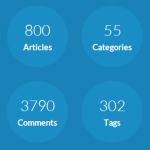How should people be grouped together? Basically there are two main options to choose from:…
The Best Used Books in My Library
Last week I finished the last minor boring details of my book. One of my many mind-numbing tasks was to cross-check all references (in the body text) with the bibliography (at the end.) Yes, I know. I should have used a way to automate this before I started writing. But I didn’t. Boohoo. Shame and pity on me.
Anyway, that’s how I got to understand (for the first time) which books I have actually used most often during the last 1.5 years. And that’s how I noticed that there’s a big difference between liking a book and actually using it.
So… these are the 24 books I have used most often, while writing my own book. Maybe you find some of them as interesting (and useful) as I did.
Interestingly enough, I find the list a bit surprising. I had thought other favorite books of mine would have ended up on top. But apparently, some books are only appealing and memorable, while others are more useful and durable.
If you want to see my full list 215 references to books and articles, I’m afraid you will have to wait just a little while. It looks like my own book will be in the stores by the end of December. 🙂
(picture by luiginter)
Jurgen is an experienced author, trainer, and speaker. Why don’t you hire him to add some spice to your company event or seminar?
 Twitter –
Twitter –  Subscribe –
Subscribe –  Newsletter –
Newsletter –  LinkedIn –
LinkedIn –  SlideShare
SlideShare
| Latest, greatest and favoritest posts: Cross-Functional Teams Don’t Come Free No Maturity Models, But Individual Competence Self-Organization vs. Anarchy |




